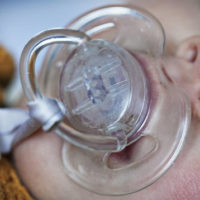New Study Highlights Toxins in Baby Pacifiers

A new study just released by the American Chemical Society found that the most popular teething rings contain hormone-disrupting chemicals and toxins linked to an increased risk of developing cancer, obesity, and heart disease. Although the teethers were found to contain these harmful substances—including Bisphenol A (BPA), Bisphenol S, Bisphenol F, parabens, and antimicrobials (such as triclosan and triclocarban)—many of the products were advertised as “BPA-free” or “non-toxic.” The teethers were also found to leach chemicals into water, which is similar to the composition of baby saliva.
In addition to being linked to cancer and heart disease, these chemicals can also affect IQ levels and cause neurological and behavioral disorders, such as ADHD and autism. While some of the chemicals are regulated individually, little is known about the accumulation of multiple endocrine-disrupting chemicals, and many are still completely unregulated, even though they can harm people when used in products.
The Dangers
Parabens are reportedly used in teethers that contain water or gel in order to prevent the growth of microorganisms; along with antimicrobials triclosan and triclocarban, they were banned for use by the Food and Drug Administration (FDA) because of their ability to cause bacterial resistance and hormonal effects. Based on the FDA’s studies, parabens were found to be the most commonly leached of the chemicals.
According to experts, about 90 percent of Americans have BPA in their bodies, indicating that the chemical is still prevalent even though the FDA banned the use of BPA in baby bottles and sippy cups in 2012. While the plastics industry has responded that the levels of BPA used in other baby products are too low to present a health risk, recent studies have indicated that even at the microgram or nanogram level, they can cause harm. FDA researchers are especially concerned about those who are most vulnerable, including young children; not only are they vulnerable, but they are a particularly difficult demographic to study. Scientists typically have to rely on insight gained from animal-based studies in order to make predictions about how a chemical will affect a young child.
What also concerns researchers is the combination of all these individually-studied chemicals; specifically, that putting together this “cocktail of chemicals, even in low amounts, during the critical stages of development, can have an effect in many stages of life.” Even though, in our everyday lives, we are exposed to chemicals mixed with other chemicals, there is a research void in that these substances are typically tested individually.
Labeling Concerns
In addition to concerns over the combination of chemicals and the effects they can have on toddlers throughout their lives, the researchers were also understandably concerned about the fact that these products were labeled “non-toxic.” The products themselves can be toxic under some circumstances, especially when used in unanticipated ways, such as if someone applies a certain amount of heat in using the product.
Personal Injury & Product Liability Attorneys Protecting Consumers
If you or a loved one has been injured by a product that contains harmful substances, contact one of our experienced personal injury attorneys at Lavalle, Brown & Ronan right away to find out what your options are. We serve clients in Boca Raton and the surrounding areas.
For more information and in depth analysis, please contact Attorney Ken Ronan at kronan@bocalaw.com and Case Manager Richard Bagdasarian at rbagdasarian@bocalaw.com.
Resources:
foxnews.com/health/2016/12/07/baby-teethers-may-contain-low-levels-bpa-study-finds.html
pubs.acs.org/doi/abs/10.1021/acs.est.6b04128
source https://richardbagdasarian.wordpress.com/2017/02/15/richard-bagdasarian-attorney-new-study-highlights-toxins-in-baby-pacifiers/
No comments:
Post a Comment